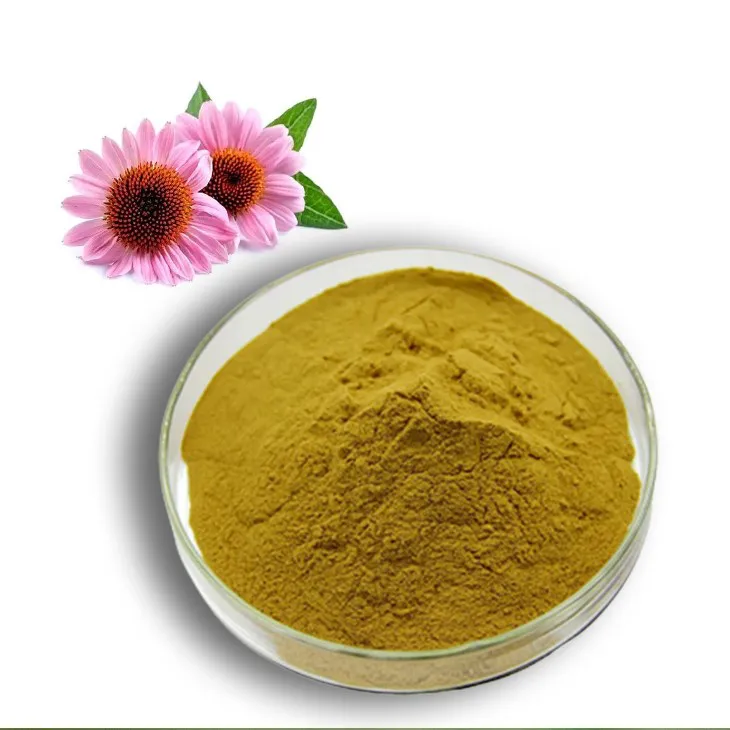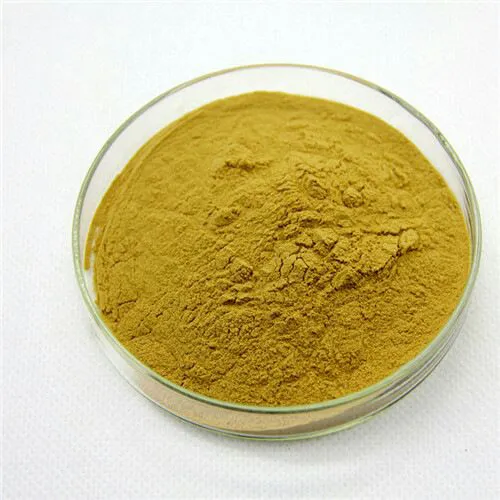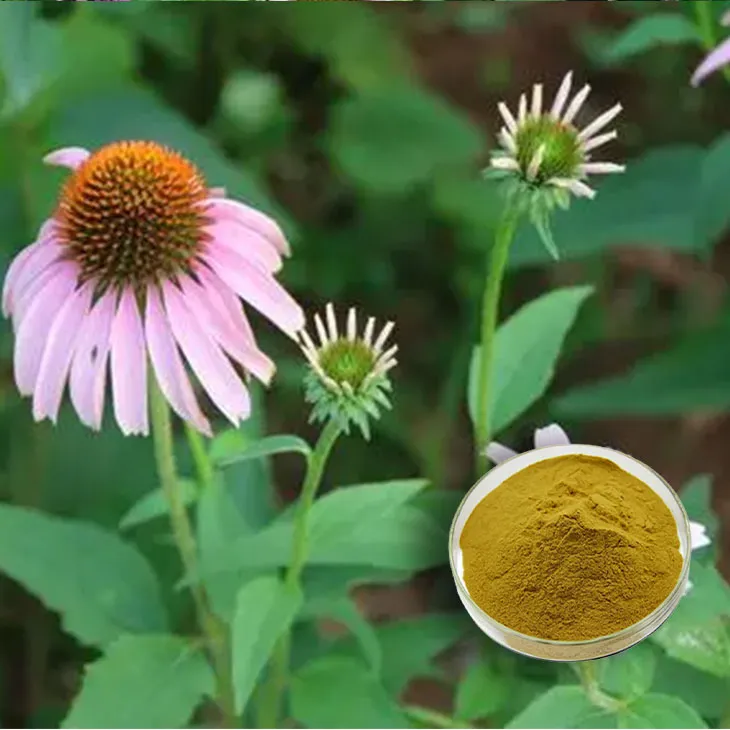- 0086-571-85302990
- sales@greenskybio.com
What is echinacea extract and why use it on the skin?
2024-11-14

1. Introduction to Echinacea Extract
Echinacea Extract is a substance that is obtained from the Echinacea plant. The Echinacea plant is native to North America and has a long history of use in traditional medicine. There are several species of Echinacea, and the extract is typically made from the roots, leaves, or flowers of the plant. The extraction process involves various techniques to isolate the active compounds present in the plant, which are then used in different applications, including skin care.

2. Composition of Echinacea Extract
Echinacea extract contains a rich variety of chemical components, which contribute to its diverse properties. Some of the key components include:
2.1 Alkamides
These are lipid - soluble compounds that are thought to play a role in the plant's immune - enhancing properties. In the context of skin care, alkamides may help to modulate the skin's immune response, potentially reducing inflammation and protecting the skin from external threats.
2.2 Polysaccharides
Polysaccharides are large carbohydrate molecules. In Echinacea extract, they are believed to have immunomodulatory effects as well. They can also contribute to the moisturizing properties of the extract, helping the skin to retain water and maintain its elasticity.
2.3 Flavonoids
Flavonoids are a class of plant secondary metabolites with antioxidant properties. In skin care, they can help to neutralize free radicals, which are unstable molecules that can damage skin cells and contribute to premature aging.

3. Benefits of Echinacea Extract for the Skin
Echinacea extract offers several benefits when used in skin care products:
3.1 Enhancing Skin's Immune Function
- The skin is the body's first line of defense against external factors such as bacteria, viruses, and environmental pollutants. Echinacea extract can strengthen the skin's immune system, enabling it to better recognize and respond to these threats.
- It can stimulate the production of certain immune cells in the skin, such as macrophages and lymphocytes. These cells play a crucial role in fighting off infections and maintaining skin health.
- By enhancing the skin's immune function, echinacea extract can help to reduce the occurrence of skin infections, such as acne caused by bacteria or fungal infections.
3.2 Moisturizing the Skin
- As mentioned earlier, the polysaccharides in echinacea extract contribute to its moisturizing properties. These molecules can bind to water molecules, forming a hydrating layer on the skin's surface.
- Moisturized skin looks healthier, feels smoother, and is less likely to develop dry patches or flakiness. Echinacea extract can be especially beneficial for people with dry or dehydrated skin types.
- It can also improve the skin's barrier function. A well - hydrated and intact skin barrier is better able to prevent water loss and protect the skin from external irritants.
3.3 Whitening and Skin Tone Improvement
- Echinacea extract has the potential to inhibit the production of melanin, the pigment responsible for skin color. By reducing melanin production, it can help to lighten dark spots, hyperpigmentation, and even out the overall skin tone.
- This whitening effect can be particularly appealing for individuals who are concerned about uneven skin tone due to factors such as sun damage, acne scars, or hormonal changes.
- However, it should be noted that the whitening effect of echinacea extract is relatively mild compared to some other more potent skin - whitening agents, and it may take longer to see visible results.
3.4 Anti - Inflammatory Properties
- The active components in echinacea extract, such as alkamides and flavonoids, possess anti - inflammatory properties. They can help to reduce redness, swelling, and irritation on the skin.
- This makes echinacea extract suitable for use in treating skin conditions such as eczema, psoriasis, and rosacea, which are often characterized by inflammation.
- By alleviating inflammation, it can also promote the healing process of the skin, for example, in cases of minor cuts, burns, or abrasions.
3.5 Antioxidant Activity
- Flavonoids in echinacea extract act as antioxidants. Antioxidants are essential for protecting the skin from oxidative stress, which is caused by an imbalance between the production of free radicals and the body's antioxidant defense mechanisms.
- Oxidative stress can lead to various skin problems, including premature aging, wrinkles, and dull skin. By neutralizing free radicals, echinacea extract can help to maintain the skin's youthful appearance and vitality.
- Regular use of skin care products containing echinacea extract can contribute to long - term skin health by reducing the cumulative damage caused by oxidative stress over time.

4. How to Use Echinacea Extract in Skin Care
- Look for skin care products that contain echinacea extract: These can include creams, lotions, serums, and masks. Read the product labels carefully to ensure that the echinacea extract is one of the main active ingredients.
- Patch test before use: Since some people may be allergic to echinacea or other ingredients in the product, it is advisable to perform a patch test. Apply a small amount of the product to a small area of skin, such as the inside of the wrist, and wait for 24 - 48 hours to see if any adverse reactions occur.
- Follow the product instructions: Different skin care products have different application methods and frequencies. For example, a serum may be applied once or twice a day, while a mask may be used once or twice a week. Follow the recommended usage instructions to achieve the best results.
- Combine with other skin care products: Echinacea extract can be used in combination with other beneficial skin care ingredients. For example, it can be paired with hyaluronic acid for enhanced moisturizing effects, or with vitamin C for additional antioxidant protection.

5. Precautions and Considerations
- Allergic reactions: Although echinacea is generally considered safe for most people, some individuals may be allergic to it. If you experience any signs of an allergic reaction, such as itching, redness, or swelling, discontinue use immediately and consult a doctor.
- Quality of products: Ensure that you are using high - quality skin care products containing echinacea extract. Poor - quality products may not contain the effective amount of echinacea or may be contaminated with other substances.
- Pregnancy and breastfeeding: There is limited research on the safety of using echinacea extract during pregnancy and breastfeeding. It is best to consult a healthcare provider before using any skin care products containing echinacea during these periods.
6. Conclusion
Echinacea extract is a valuable ingredient in skin care due to its multiple beneficial properties. It can enhance the skin's immune function, moisturize the skin, improve skin tone, reduce inflammation, and provide antioxidant protection. However, like any skin care ingredient, it is important to use it properly and be aware of any potential risks. By understanding the properties and uses of echinacea extract, consumers can make informed decisions when choosing skin care products to maintain healthy and beautiful skin.
FAQ:
Question 1: How is Echinacea extract made?
Echinacea extract is made by extracting beneficial components from the Echinacea plant. This typically involves processes such as drying the plant material and then using solvents like ethanol or water to draw out the active compounds.
Question 2: Is Echinacea extract suitable for all skin types?
Generally, Echinacea extract is suitable for most skin types. However, some people with extremely sensitive skin may need to do a patch test first. Since it has multiple beneficial properties such as enhancing immunity and moisturizing, it can be beneficial for normal, dry, and combination skin. For oily skin, its anti - inflammatory properties may also be helpful in reducing skin inflammation.
Question 3: Can Echinacea extract cause any side effects on the skin?
While Echinacea extract is generally safe for skin use, in rare cases, some people may experience mild irritation or allergic reactions. This is more likely in individuals with pre - existing sensitivities to plants in the daisy family, to which Echinacea belongs. If any redness, itching, or swelling occurs after using a product containing Echinacea extract, it is advisable to stop using it immediately.
Question 4: How long does it take to see the effects of Echinacea extract on the skin?
The time it takes to see the effects of Echinacea extract on the skin can vary. For moisturizing effects, some improvement in skin hydration may be noticed relatively quickly, perhaps within a few days to a week. However, for effects like skin whitening or significant enhancement of the skin's immune function, it may take several weeks to months of consistent use to observe more noticeable changes.
Question 5: Are there any other benefits of Echinacea extract apart from skin care?
Yes, apart from skin care, Echinacea extract has been used for its potential immune - boosting properties in herbal medicine. It may help the body's overall immune system, potentially reducing the severity or duration of colds and other infections when taken orally in appropriate forms. However, it's important to note that more research is still needed to fully understand all of its non - skin - related benefits.
Related literature
- The Role of Echinacea in Skin Health"
- "Echinacea Extract: Properties and Applications in Dermatology"
- "Beneficial Effects of Echinacea on Skin Immunity"
- ▶ Hesperidin
- ▶ citrus bioflavonoids
- ▶ plant extract
- ▶ lycopene
- ▶ Diosmin
- ▶ Grape seed extract
- ▶ Sea buckthorn Juice Powder
- ▶ Beetroot powder
- ▶ Hops Extract
- ▶ Artichoke Extract
- ▶ Reishi mushroom extract
- ▶ Astaxanthin
- ▶ Green Tea Extract
- ▶ Curcumin Extract
- ▶ Horse Chestnut Extract
- ▶ Other Problems
- ▶ Boswellia Serrata Extract
- ▶ Resveratrol Extract
- ▶ Marigold Extract
- ▶ Grape Leaf Extract
- ▶ blog3
- ▶ blog4
- ▶ blog5
-
Organic Tongkat Ali extract powder factory.
2024-11-14
-
How to make powder with ashwagandha extract.
2024-11-14
-
Rosehip extract manufacturers from China.
2024-11-14
-
The best cat's claw extract in nature.
2024-11-14
-
Chinese Dandelion Leaf Extract Suppliers.
2024-11-14
-
Saw Palmetto Extract
2024-11-14
-
Golden Seal Extract
2024-11-14
-
Curcumin
2024-11-14
-
Honeysuckle Pollen
2024-11-14
-
Baicalin
2024-11-14
-
Horse Chestnut Extract
2024-11-14
-
Chaste Berry Extract
2024-11-14
-
Resveratrol extract
2024-11-14
-
Scutellaria Extract
2024-11-14
-
Camu Camu Extract
2024-11-14





















